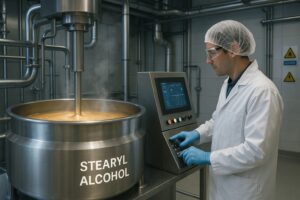
A reliable partner in the supply of chemical raw materials
We provide a comprehensive order fulfillment process, a partnership approach and accountability in every aspect of our business.
Read moreAcesulfame potassium (ACESULFAM K) is a high-intensity synthetic sweetener widely used in the food and pharmaceutical industries. Its sweetness is estimated to be about 200 times that of sucrose, making it an extremely efficient ingredient in the production of low-calorie and sugar-free products. In addition to its exceptional taste properties, Acesulfame K is distinguished by […]
Acesulfame potassium (ACESULFAM K) is a high-intensity synthetic sweetener widely used in the food and pharmaceutical industries. Its sweetness is estimated to be about
In this article, we will take a closer look at the chemical structure, physical properties, applications and safety aspects of this popular industrial sweetener.
Acesulfame K is one of the most widely used intense sweeteners. It is used in light drinks, desserts, jams, yogurts, candies, chewing gums and baked goods. Due to its high resistance to temperature and pH, it is ideal for heat-treated products.
Acesulfame K is widely used as an auxiliary ingredient in medicines and supplements – especially in syrups, lozenges and effervescent preparations, where it improves flavor without adding calories.
With zero calories, acesulfame potassium is used in foods and beverages for people on low-carbohydrate diets, including diabetics. It is often combined with other sweeteners, such as aspartame or sucralose, for a more natural flavor profile.
Acesulfame K has been approved by numerous regulatory bodies, including EFSA, FDA and WHO. It has an ADI (Acceptable Daily Intake) designation of : 15 mg/kg body weight. It is considered safe for consumption within established limits and does not exhibit mutagenic or carcinogenic properties. In the European Union, it appears under the additive number E950.
In industrial products, such as those available from Vichemic, it meets purity and quality standards in accordance with FCC and USP requirements.
Acesulfame potassium is an extremely effective industrial sweetener whose properties make it an ideal ingredient in dietary, sugar-free and low-calorie products. Its heat resistance, low cost of use and safe consumption make it widely used in the food and pharmaceutical industries. The availability of Acesulfame K in high purity at vichemic.co.uk makes it a noteworthy product for professionals seeking the highest quality raw materials.

We provide a comprehensive order fulfillment process, a partnership approach and accountability in every aspect of our business.
Read more
Polyvinyl alcohol (PVA) is a synthetic, water-soluble polymer with exceptional versatility. Its physicochemical properties – including its ability to form films, high viscosity, biocompatibility and non-toxicity – make it used in dozens of industries: from pharmaceuticals and cosmetics to construction and eco-friendly production of water-soluble packaging. Vichemic – Polyvinyl alcohol offers a raw material with […]
Read more
Stearic alcohol, also known as 1-octadecanol, is a long-chain saturated fatty alcohol with the formula C₁₈H₃₈O. Despite its technical-sounding name, it is one of the mildest and most desirable ingredients used in cosmetics, pharmaceuticals and the engineering industry. Its key properties – a soft, waxy texture, excellent emollient properties and a neutral fragrance – make […]
Read more